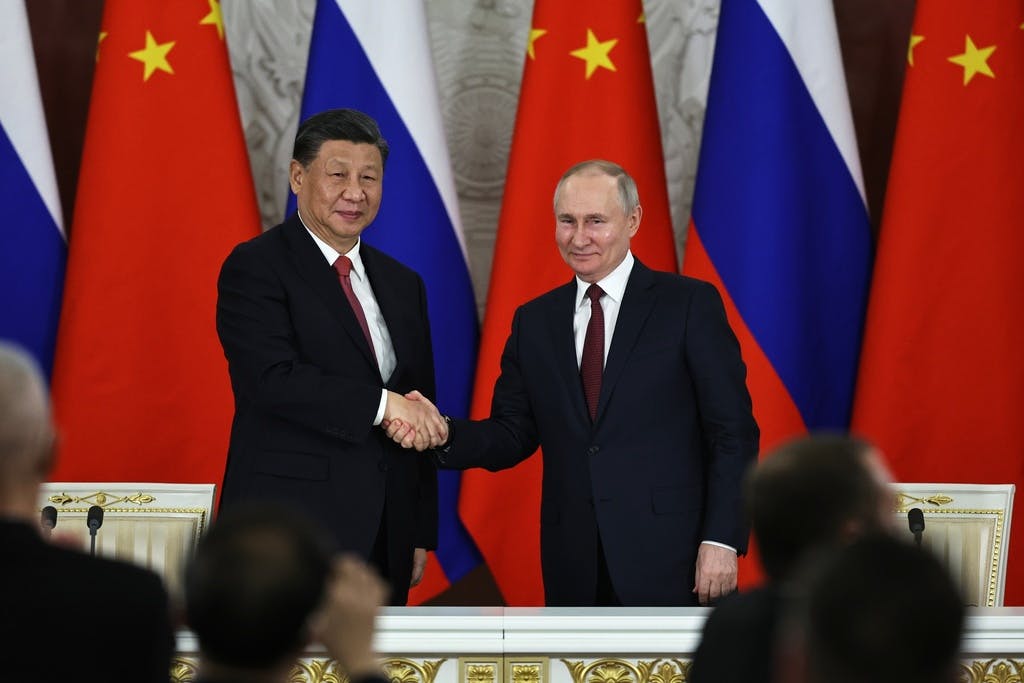China Stirs the Pot on Crimea, and Virtual Brawl Ensues
Beijing tries to walk back a diplomat’s comments, and yet it’s too late.

Vladimir Putin’s top ally, Communist China, has through a series of blunders waded into the debate over the status of Crimea that will make less likely the prospect of President Xi phoning President Zelensky any time soon. The brouhaha began when Beijing’s envoy to France, Lu Shaye, told French broadcaster LCI that the ownership of the Crimean peninsula, which Mr. Putin illegally annexed in 2014, “depends on how you perceive the problem” and that it “originally belonged to Russia.” Yet there was more to the Communist’s bite than that.
After casting doubt on Ukraine’s claim to the peninsula by reminding his interviewer that a former Soviet leader, Nikita Khrushchev, “gave [Crimea] to Ukraine,” Mr. Shaye questioned the legitimacy of “some ex-Soviet Union countries.” He implied that the Baltic states “do not have an effective status in international law, since there is no international agreement that would specify their status as sovereign countries.”
That comment drew the swift condemnation of the EU’s top diplomat, Josep Borrell, who called it “unacceptable.” Latvia’s minister of foreign affairs, Edgars Rinkēvičs, said that “the remarks of the Chinese ambassador to France on international law and the sovereignty of nations are completely unacceptable” and that “we expect explanations from the Chinese side and a complete refutation of this statement.”
The Estonian and Latvian ministries of foreign affairs reportedly summoned their Chinese ambassadors for a dressing-down. Beijing has no ambassador at Vilnius amid an ongoing diplomatic tussle with Lithuania.
Ukraine’s ambassador to Paris, Vadym Omelchenko, deadpanned that the Chinese ambassador might have “problems with geography” and took it upon himself to remind Beijing, via social media, that “the Soviet empire no longer exists.” He added that “next time, it would be better to hear this question: Who owns Vladivostok?”
On Monday, the Chinese foreign ministry spokeswoman, Mao Ning, tried to walk back Mr. Shaye’s comments, saying at a briefing, “China respects the sovereignty of all former republics of the USSR.”
While that may be the case, Beijing is ever faithful to presenting a selective version of history, including its own. In the latest instance, it has scrubbed the ambassador’s speech from the record. While Mr. Shaye’s comments were posted in full on the Chinese embassy’s WeChat account, by Monday morning they were gone, replaced with a message that said the transcript had been “deleted by the author.”
Furor over the comments about the Baltics will likely fizzle the fastest, though they will do nothing to burnish relations between Beijing and the three countries that since the Russian invasion of Ukraine have found themselves in the role of NATO’s vital eastern shield against a bellicose Kremlin.
Yet it is the pontificating about Crimea that frosts Ukraine and does more than simply speak to Communist China’s lack of politesse.
For one thing, a more astute diplomat would know that while Crimea previously belonged to Russia, it was not the “original” owner. Ancient Greeks, Venetians and Genovese, and Mongols controlled strategic portions of it before Catherine the Great left her imperial footprint on the place. Not even the most ardent historical revisionists would suggest that the peninsula revert to Greek or Mongolian ownership.
There is no doubt that Crimea’s historical Russian ties run deep and that the peninsula is a trip wire for Mr. Putin. The Chinese kerfuffle comes at the same time that Mr. Zelensky signed a so-called decolonization law that will ban the use of words associated with Russia and the former Soviet Union. It prohibits the assigning of names to geographical locations and objects linked to Russia. Moscow has decried the move as “de-Russification” and, more tellingly, forced assimilation.
Russia has been accused of trying to reshape the demographics of Crimea since its takeover in 2014. Still, even before the land grab, Ukrainian officials estimated that the population of the peninsula was about 60 percent ethnic Russian, and less than a quarter ethnic Ukrainian.
In that context, it might be more accurate to say that the Chinese ambassador lifted the lid on the pot that Moscow has been stirring.
Ukraine has on multiple occasions targeted military installations and civilian infrastructure like the Kerch Bridge at Crimea. Russia, for its part, has been fortifying the peninsula against an anticipated Ukrainian counteroffensive. It has also launched missile strikes against adjacent areas, such as the resort town of Ochakiv opposite the strategic Kinburn spit.
Crimea is heavily fortified. Russia’s Black Sea Fleet, though diminished after more than a year of war with Ukraine, is still headquartered at Sevastopol. If and when the brunt of fighting shifts to Crimea from the Donbas region, there is little doubt it will get very nasty very fast.
At least the world now knows, more or less officially, how Communist China feels about this, in advance.

